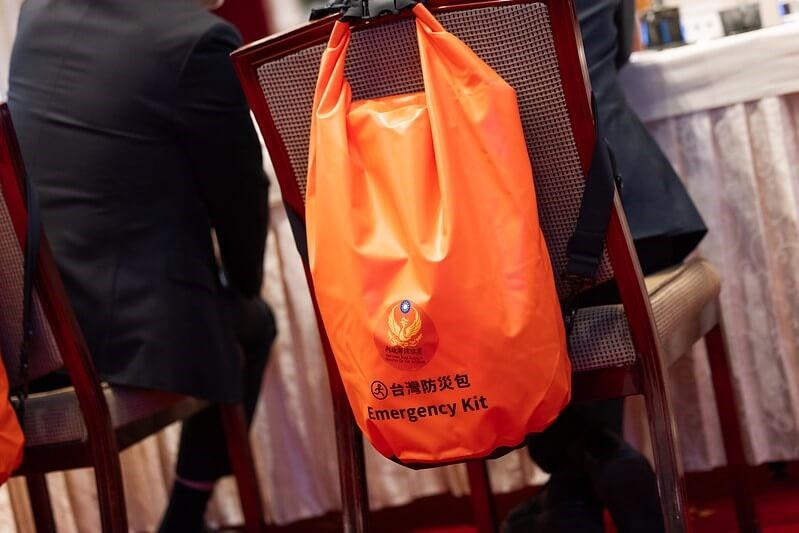TAIPEI — Amid rising cross-strait tensions and recent warnings from U.S. officials, go bags—emergency kits designed for natural disasters or wartime evacuations—are rapidly gaining popularity in Taiwan. Sparked by a social media post from the American Institute in Taiwan (AIT), the trend has triggered a national conversation and a sharp spike in sales.
On June 11, the AIT’s Kaohsiung branch posted a message on Facebook urging people to prepare “go bags” as a crucial part of emergency readiness. The post emphasized the importance of being ready for any unexpected situation—whether natural or man-made.
Following the post, interest in the Chinese term for go bag (避難包) skyrocketed on Google Trends, jumping from a score of 8 on June 10 to a perfect 100 just three days later. Online retailers also saw a dramatic sales spike, with some businesses reporting a 700–800% increase in orders compared to earlier in the month.
Sales Surge and War Concerns Drive Preparedness
Bonny Lu (盧秉慧), CEO of SafeTaiwan, a company that sells pre-packed go bags, told CNA that their daily sales doubled on June 11 and exploded eightfold by June 12. She added that overall go bag sales in the first half of 2025 were five times higher than the latter half of 2024.
“People have become more aware of the risk of conflict, and the top reason our customers give for buying go bags now is fear of war,” Lu said.
Personal Stories: Why People Are Getting Ready
Among those preparing for emergencies is Arnas Kuo (pseudonym), an environmental specialist in her 30s living in Taipei. She said her motivation came after hearing repeated warnings from U.S. officials about China’s military buildup.
“Normally, one warning wouldn’t worry me. But when it came twice, back-to-back, I knew it was time to take it seriously,” Kuo said.
Her go bag includes food, water, hygiene items, and even a portable toilet. Living alone, she plans to shelter in place, but if her home becomes unsafe, she’ll head to the nearest air-raid shelter with her kit, packed to support her for three days.
Amy Chang, a schoolteacher and mother living in Taoyuan, echoed those concerns. She started stockpiling supplies after observing a spike in military activity and political unrest in late May.
“I felt the danger wasn’t just from outside anymore. We’re facing internal and external threats,” she said. Her go bag preparations include freeze-dried food, water, and supplies for her family of three to shelter in place for up to three months.
She’s even begun acclimating her 2-year-old child to emergency rations by incorporating freeze-dried food into daily meals.
Analyzing the Trend
Although the AIT clarified that its post was intended to encourage natural disaster preparedness, experts say the public’s heightened sensitivity to geopolitical threats is driving the surge.
Dr. Lin Thung-hong (林宗弘), a disaster preparedness expert at Academia Sinica, noted that concern about war has become mainstream. Survey results show that more people now believe conflict with China could erupt within the next two years.
“Taiwanese people have long lived with earthquake risks,” Lin said. “But now, with the political and economic heart of the country concentrated in the north and west, those areas are being recognized as likely targets in a war, pushing nationwide awareness to a new level.”
Despite years of government promotion, Lin noted that go bags never caught on with the general public—until now.
What Goes Into a Go Bag?
The government recommends preparing enough supplies for three days, but Lu advises prioritizing essential items that would significantly impact survival if forgotten. These include:
-
Water and food
-
Personal medications
-
Flashlights or light sources
-
Basic hygiene items
-
Emergency clothing
For wartime readiness, extras like water filters, walking gear, and multi-day rations are becoming common additions.
A Nation Getting Ready
As more Taiwanese begin to take emergency preparedness seriously, stories like Kuo’s and Chang’s reflect a broader societal shift. While motivations vary—from natural disasters to the possibility of military conflict—the result is the same: more people are actively preparing for the unexpected.
“Taiwan may not be equipped for a prolonged war,” Chang said. “But we can at least be prepared to survive the first few days.”



